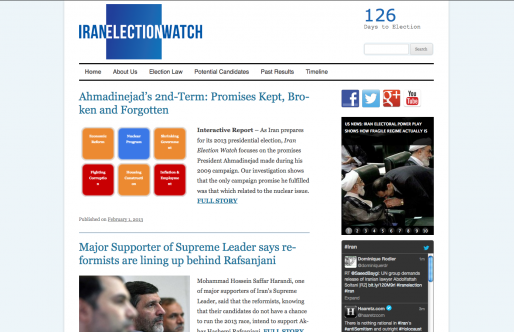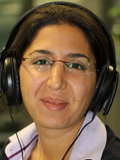This is the first in our series of posts from our 2012 MJ Bear Fellows, three journalists under 30 who are beginning to make their voices heard and expand the boundaries of digital news. Fellow Denise Hassanzade Ajiri is a web writer for Radio Farda.

When I attended ONA’s annual conference in San Francisco last September, I struggled to fit in among the crowd of ambitious journalists. Everything was new for me — the way journalists interacted, the way they came up with interesting ideas, the way they were leading projects. To be honest, I felt out of place describing myself only with a simple title: “I am a web writer at Radio Free Europe.” Full stop. It was one of those moments when I wondered what I was contributing to the world of journalism.
During those three days, though, I had a revelation. After meeting media entrepreneurs and listening to their stories about how they started projects, I suddenly came up with my own concept: Iran Election Watch.
It seemed like perfect timing. The Iranian presidential election will be held in June. Why not start a website in English to cover it?
The Iran Election Watch website is still a newborn, having officially launched Jan. 22. Evaluating it shall be left to others, but I can share what I’ve learned up until now from leading a project with several collaborators who not only already work or study full time, but who are living in different parts of the world.
Dare to share and dare to start
This is so cliché, but still I can’t stop myself from repeating it. For me, even thinking about something new was a struggle, let alone sharing it with others. I prejudged people’s reactions: “What? A website on the Iranian presidential election? You need a huge team to do that. Come on, Denise. It is not possible.” I finally pushed myself to talk to my colleagues, friends, senior journalists and advisers. The moment I started talking, I was able to visualize what I really wanted to do and how to do it. The more I talked, the more advice I got, and the more the idea took shape.
Starting up
When you are a small group of three, you have to be ready to do everything on your own, from designing the website to preparing the content to marketing the product. At the beginning, as with all projects, we wrote up a proposal. Then we built the website, with Nima Tamaddon in charge, getting ideas from the team.
At the moment, Nima and I both decide about the topic(s) we cover. I am mostly in charge of the content and gathering the data, Nima is responsible for executing the data in an interactive way and Mike Hirshman edits our work.
It would be ideal, of course, if we had full financial support. In our case, we were not able to raise funds, but since our project is time sensitive, we decided to dive in and work later on fundraising — something we need to educate ourselves on.
Working on a big issue with a small group
Like us, you may have picked a huge topic to report on, but that doesn’t mean you can’t do it with small number of people. It takes more effort, it takes more energy, it requires you to narrow down your activities, but, on the other hand, a smaller group is easier to manage. You become more creative and efficient, making it easier to come up with less time-consuming strategies. You learn to have a Plan B: If we can’t produce a lot of stories in a day, instead we produce a few very good ones. You still can be somehow creative and you still can create a buzz.
Long-distance cooperation
Iran Election Watch is spread across three different time zones, with me being in Prague, Nima in Washington DC and Mike in San Diego. If you are aiming for a fast turnaround, this can be a problem — but a manageable one. Thanks to Gmail and Google Drive, we are able to work together without sitting next to each other. And thanks to Skype, Viber, Voxer, etc., that help us be in constant contact — for free!
Time stretches
Most of us are either working or studying full time. Iran Election Watch is an important project, but we are not able to devote all of our energies to it. When I was conceiving the project, one of my main issues was time, since I have never been a workaholic. I couldn’t picture myself sitting and working all day. With this project, that never happened. Instead I learned to manage my time and to use it more wisely. I am still working full time, I still hang out and still travel. I don’t know how this works, but when you add to your daily responsibilities, time somehow stretches
In the end, I can’t predict how this project will turn out, but I know it continues to teach me a lot as a journalist. And at least I can say I dared to do it.
 Fellow Denise Hassanzade Ajiri is a web writer for Radio Farda, Radio Free Europe and one of ONA’s three MJ Bear Fellows for 2012.
Fellow Denise Hassanzade Ajiri is a web writer for Radio Farda, Radio Free Europe and one of ONA’s three MJ Bear Fellows for 2012.
The fellowship is awarded annually to up-and-coming early-career journalists inside or outside the newsroom who are just beginning to make their voices heard in the industry and working to expand the boundaries of digital news.
